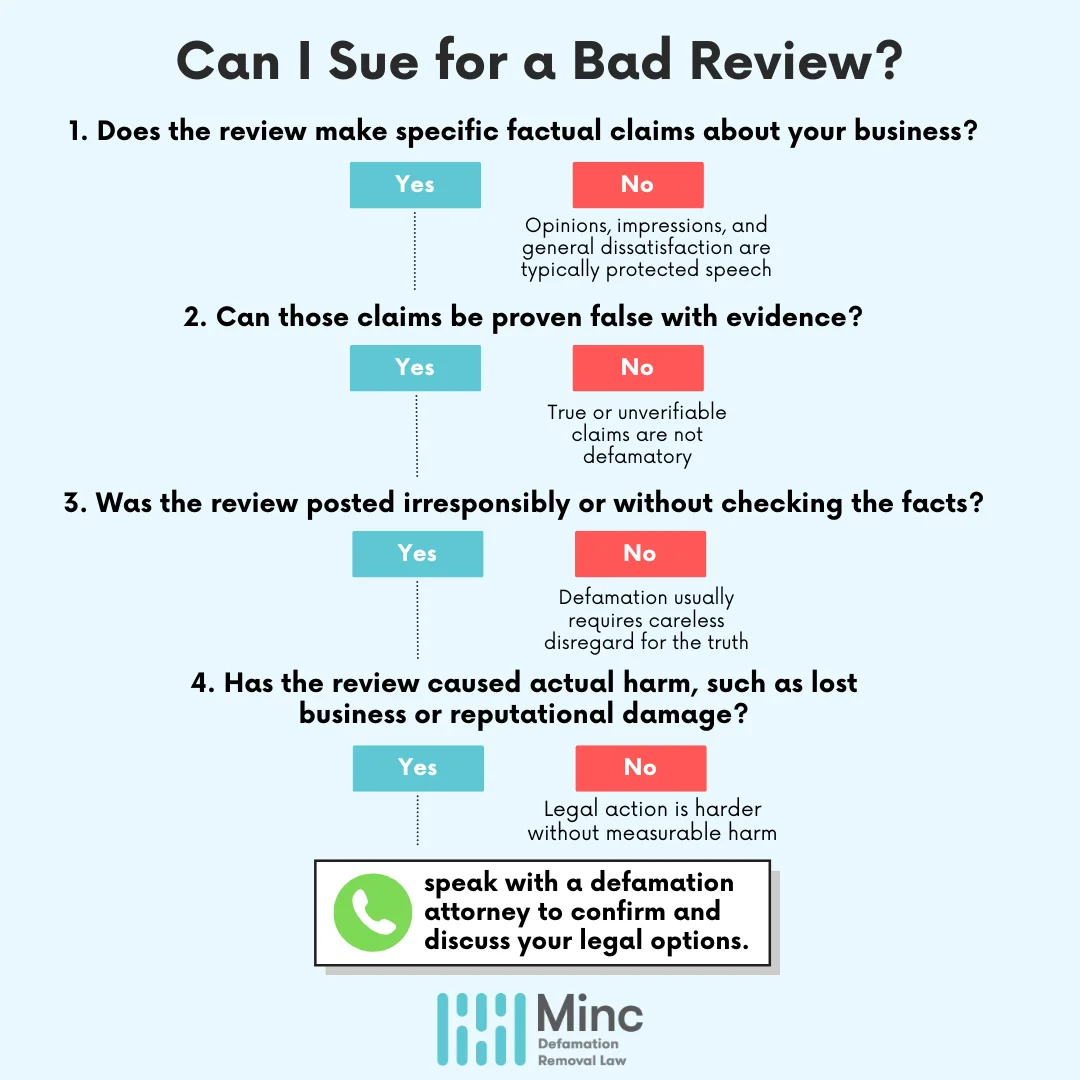
- Originally Published on July 14, 2025
Can You Sue Someone for a Bad Review Against Your Business?
Online reviews have become a powerful force in shaping public perception. For business owners, a single negative review, especially one that spreads misinformation, can damage hard-earned reputations and lead to real financial losses. But when does a bad review cross the legal line? And can you sue the person who wrote it?
At Minc Law, we’ve handled thousands of online defamation matters and successfully helped businesses across nearly every industry remove false reviews, identify anonymous posters, and pursue legal action when necessary. Our attorneys focus exclusively on internet defamation and reputation protection, giving us the experience and insight to resolve these cases quickly and discreetly.
In this guide, you’ll learn:
When a review becomes legally actionable,
How to handle anonymous or fake reviewers,
What legal options (short of suing) are available,
What to expect if you go to court, and
How an attorney can help remove the review and protect your business.
What to Do Immediately After Receiving a Harmful Review
If you’ve just discovered a negative or false review, take these initial steps before reacting publicly or pursuing legal action:
- Stay calm. Avoid emotional or defensive responses.
- Document everything. Take screenshots, record dates and times, and gather any related evidence.
- Review the platform’s guidelines. Check if the review violates terms of service and can be flagged or reported.
- Avoid responding publicly unless guided by legal counsel.
Understanding Defamation in the Context of Online Reviews
Defamation is a false statement presented as a fact that causes material harm to a person or a business’s reputation. When a defamatory statement is written or posted online, it is considered libel. If spoken, it is slander. To successfully sue for defamation, you must generally prove the following elements:
- The statement is false
- The statement is presented as fact, not opinion
- The statement caused material harm to your reputation or business
- The statement was made with negligence or actual malice
It is important to note that defamation law attempts to balance the right to free speech with the need to protect individuals and businesses from false and damaging statements. This balance can make defamation cases challenging, particularly in the context of online reviews, where the line between fact and opinion may be blurred.
What Do You Need to Prove When Suing For a Bad Review?
Not all negative reviews are defamatory. Consider the following when evaluating your situation:
False Statements Presented as Fact
If a review makes specific claims that can be proven false, such as accusing your business of fraud or illegal conduct, it may be defamatory.
Causing Material Harm to the Business
A defamation claim must show actual harm to your business. This could include lost customers, financial damage, or damage to your reputation.
Made with Negligence or Actual Malice
If the reviewer failed to verify the facts before posting, that may meet the negligence standard. If you are a public figure, you will need to prove actual malice.

Examples of Defamatory Reviews
Some online reviews go beyond negative feedback and cross the line into defamation. These reviews contain false statements of fact that could seriously damage a business’s reputation or bottom line.
Defamatory Review Example 1:
“This auto repair shop charged me for work they didn’t do and damaged my car in the process. They’re dishonest and incompetent.”
This review contains specific factual claims that, if false, could materially harm the business’s reputation and lead to lost customers. It also includes negative characterizations that are tied directly to those factual claims.
Defamatory Review Example 2:
“The surgeon botched my procedure, left a tool inside me, and tried to cover it up. I’m still dealing with the effects today.”
This review alleges serious professional misconduct. If untrue, these kinds of statements could significantly harm a medical provider’s reputation and lead to potential legal exposure for the reviewer.
When a review includes false, harmful, and verifiable statements, the business may have grounds for a defamation claim.
Examples of Non-Defamatory Reviews
Many negative reviews, even if damaging, are not legally defamatory. Reviews that express personal opinions or dissatisfaction without asserting false facts are typically protected under the First Amendment.
Non-Defamatory Review Example 1:
“I didn’t like the service at this auto repair shop. They were slow and expensive. I wouldn’t recommend them.”
This review reflects subjective opinions about pricing and customer experience. It does not make factual claims that could be proven true or false.
Non-Defamatory Review Example 2:
“This dentist seems rushed and distracted. I didn’t feel like I was a priority.”
While critical, this review expresses how the customer felt, rather than stating provable falsehoods. It is considered an opinion and is generally protected speech.
As long as a review does not contain false statements of fact, it usually will not meet the legal threshold for defamation.
Legal Protections for Reviewers and Review Sites
Before pursuing legal action against a reviewer, it is crucial to understand the legal protections that may apply:
First Amendment Rights
The First Amendment protects free speech, including the right to express opinions about businesses. Courts have held that statements of pure opinion, no matter how negative or harshly worded, cannot be defamatory.
Consumer Review Fairness Act
This federal law prohibits businesses from including clauses in their contracts or terms of service that restrict customers’ ability to post honest reviews. It also bars businesses from penalizing customers who post negative reviews.
Platform-Specific Protections
Many online review platforms, such as Yelp and Google, are protected by Section 230 of the Communications Decency Act, which shields them from liability for user-generated content. This means you generally cannot sue the platform for hosting a defamatory review, only the individual reviewer.
Steps to Take Before Suing for a Bad Review
Before resorting to legal action, consider the following steps:
Assess the Potential Impact
Carefully evaluate the potential harm the review may cause to your business. Is it a one-off complaint or part of a larger pattern? Has it significantly impacted your bottom line?
Attempt to Resolve the Issue Directly
In some cases, reaching out privately to the reviewer can help de-escalate the situation. A respectful message or sincere effort to address their concerns may lead to a voluntary edit or removal.
An attorney can assist by reviewing or drafting outreach language to ensure it does not admit liability, escalate the conflict, or interfere with potential legal claims.
Send a Cease and Desist Letter
A cease and desist letter is a formal legal notice that demands the recipient stop making false or harmful statements. It outlines the issue, requests removal or correction, and warns of potential legal consequences if the content remains.
An attorney can help assess whether a cease and desist is appropriate, draft the letter to avoid legal risk, and send it through proper channels. A letter from legal counsel often carries more weight and can lead to faster resolution without filing a lawsuit.
Consider Alternative Dispute Resolution (ADR)
Litigation can be costly and time-consuming. In some cases, alternative dispute resolution methods such as mediation or arbitration may be more efficient and cost-effective ways to resolve the issue.
When Informal Solutions Aren’t Enough
While many online defamation issues can be resolved through negotiation, takedown efforts, or private resolution, not every reviewer is cooperative. Some are anonymous and cannot be identified without court intervention. Others double down, escalate their attacks, or refuse to engage altogether.
In these cases, a defamation lawsuit may be the only viable path to protect your reputation, uncover the person responsible, or recover damages. Legal action can also compel platforms or third parties to disclose identifying information, which is often necessary when dealing with anonymous or malicious actors.
If all informal avenues have been exhausted or the harm is ongoing and severe, litigation may be required to achieve a lasting resolution.
Filing a Defamation Lawsuit: A Step-by-Step Guide
If you have exhausted other options and decided to proceed with a defamation lawsuit, here is a general overview of the process:
- Gather Evidence: Collect all relevant evidence, including screenshots of the review, proof of its falsity, and documentation of any harm suffered.
- Choose the Appropriate Jurisdiction: Determine where to file your lawsuit based on factors such as where the defendant resides, where the harm occurred, and which court has personal jurisdiction over the parties.
- File a Complaint: Draft and file a formal complaint with the court, outlining your defamation claim and the relief you seek (e.g., removal of the review, monetary damages).
- Serve the Defendant: Properly serve the defendant with a copy of the complaint and summons, notifying them of the lawsuit and their obligation to respond.
- Engage in Discovery: Exchange relevant information and evidence with the defendant through the discovery process, which may include interrogatories, depositions, and requests for the production of documents.
- Attend Pre-Trial Proceedings: Participate in pre-trial conferences, hearings, and motions as needed to narrow the issues and prepare for trial.
- Proceed to Trial or Settlement: If the case does not settle, present your evidence and arguments at trial, where a judge or jury will determine whether defamation occurred and what damages, if any, should be awarded.
Frequently Asked Questions About Defamation and Online Reviews
What if I don’t know who posted the review?
You do not need to know exactly who posted the review to take legal action. If the content is defamatory and anonymous, we may recommend filing a John Doe lawsuit to subpoena identifying information from platforms like Google, Yelp, or Facebook. Once the reviewer is identified, we can pursue removal, settlement, or formal litigation depending on the severity of the harm.
How long does a defamation lawsuit take?
Most online defamation cases take between six and eighteen months. Pre-filing steps, such as collecting evidence and identifying anonymous posters, can take several weeks. If the reviewer responds quickly or is willing to settle, the matter may resolve faster. If they refuse to cooperate or the case involves complex issues like jurisdiction or anonymity, expect a longer timeline.
What if the review is from a disgruntled former employee?
Reviews from former employees can be especially damaging and may violate more than just defamation laws. Depending on the content, these reviews might involve breaches of employment agreements, confidentiality clauses, or even intentional interference with business relationships.
An attorney can help determine whether the review crosses legal lines and advise on the best course of action, whether through a cease and desist letter, HR-based remedies, or litigation.
What can I gain from taking legal action over a bad review?
Legal action can lead to several meaningful outcomes, even if a lawsuit is never filed. Depending on the situation, hiring an attorney may result in:
- Permanent removal of the false review
- A formal retraction or correction by the reviewer
- A private settlement or resolution without litigation
- Financial compensation for business losses or reputational harm
- A court order prohibiting further defamatory statements
In many cases, the act of sending a well-crafted cease and desist letter or initiating pre-litigation steps is enough to resolve the matter. The legal pressure alone often motivates reviewers to take the content down and avoid further consequences.
Minc Law Can Help
If you are facing a false and damaging online review, it is crucial to act quickly and decisively to protect your business’s reputation. At Minc Law, we understand the complexities of online defamation cases and have a proven track record of helping clients navigate these challenging situations.
Our experienced Internet defamation attorneys can help you:
- Assess the merits of your case and advise you on the best course of action
- Gather evidence to support your defamation claim
- Draft and send cease and desist letters to reviewers and platforms
- Negotiate with reviewers and platforms to remove defamatory content
- File and litigate defamation lawsuits when necessary
- Implement proactive online reputation management strategies to mitigate the impact of negative reviews
At Minc Law, we are dedicated to providing personalized, effective legal solutions for our clients. We take the time to understand your unique situation and goals, and we work tirelessly to achieve the best possible outcome for your case.
To find out whether suing over a bad review is the right choice for your business, contact us for a free case review by calling (216) 373-7706, speaking with a Chat Representative, or filling out our online contact form below.
Get Your Free Case Review
Fill out the form below, and our team will review your information to discuss the best options for your situation.
This page has been peer-reviewed, fact-checked, and edited by qualified attorneys to ensure substantive accuracy and coverage.


![The Importance of Online Reviews: 50+ Key Statistics to Know [2020] Featured Image](https://www.minclaw.com/wp-content/uploads/2020/08/online-review-statistics-2020-300x0-c-default.jpg)

